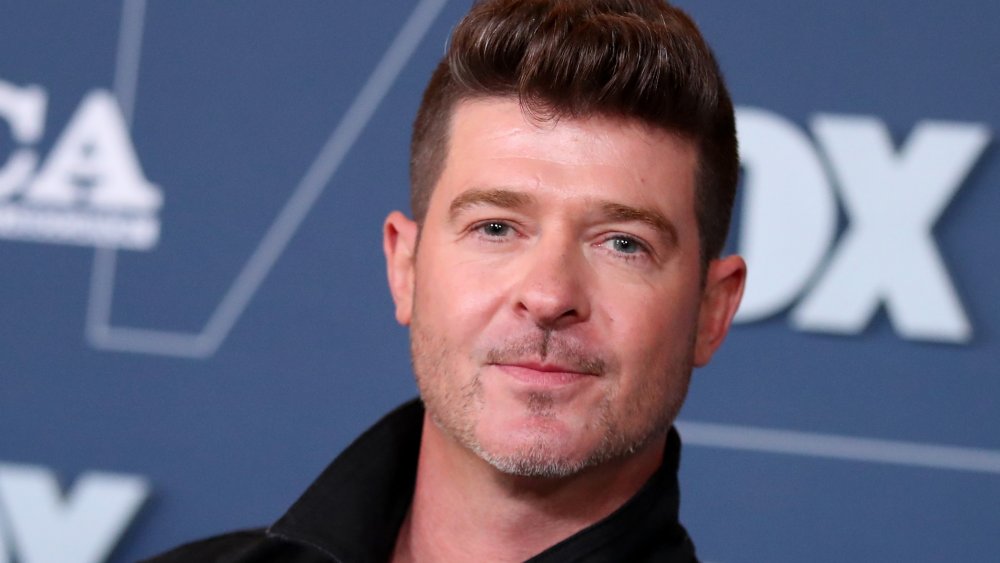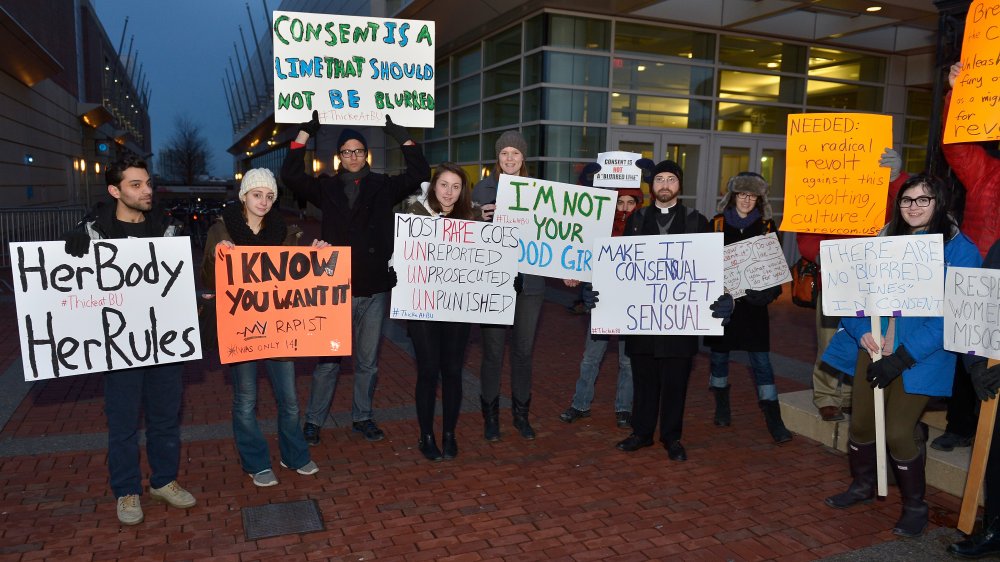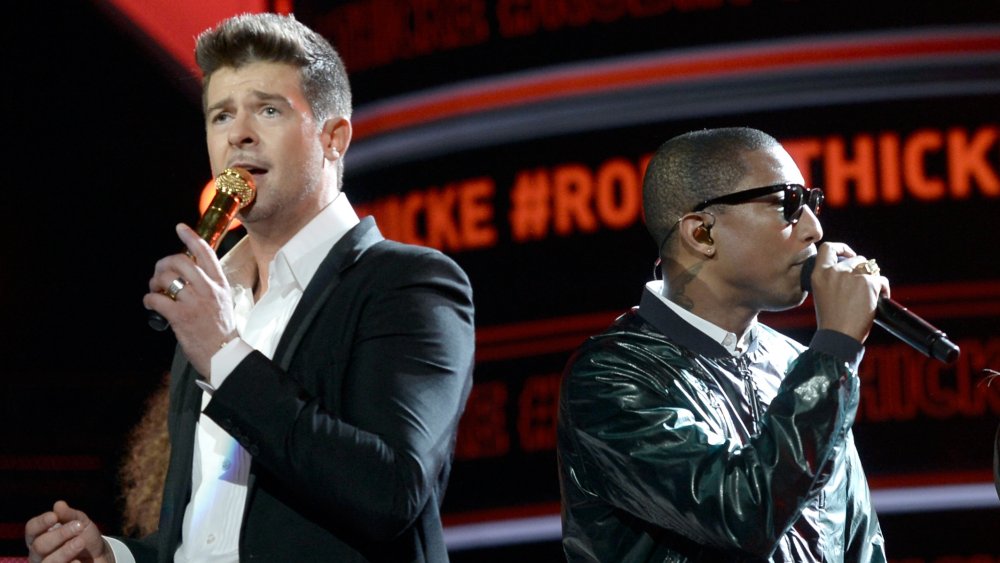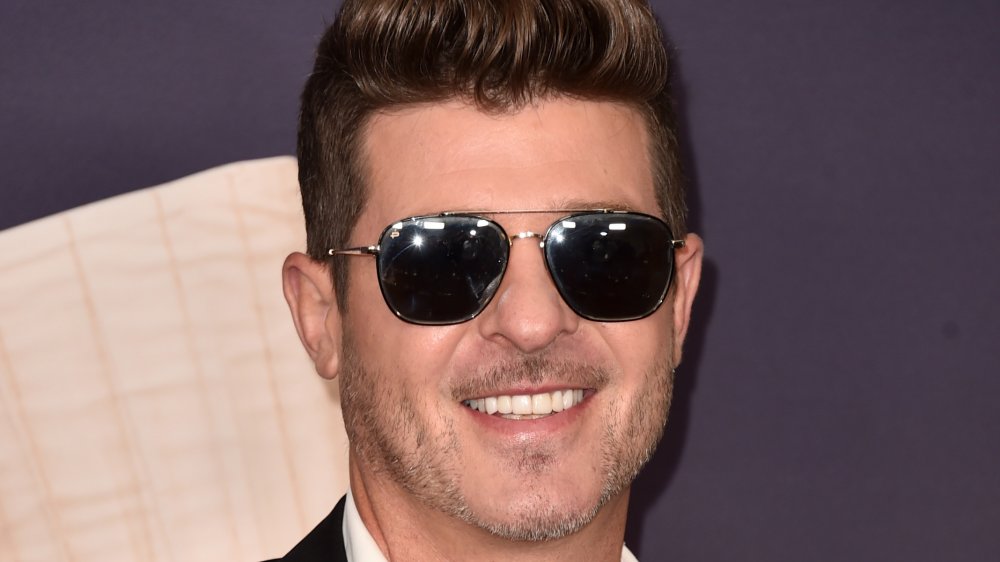Robin Thicke Should Have Never Recorded 'Blurred Lines.' Here's Why
Years before the #MeToo movement brought the concept of consent and discussions on rape culture and sexual trauma into the mainstream discourse, popstar Robin Thicke's 2013 song "Blurred Lines" helped pave the way for such conversations. Although it was widely considered a smash hit upon its release, the track quickly stirred controversy over the content of its lyrics.
As its title suggests, the lyrics were ethically murky when it came to propagating the notion that "no" doesn't actually mean "no" when it comes to sex. Paired with a sexually explicit music video accused of objectifying women — who can forget those clips of Thicke sniffing their hair? — and a memorable (if not creepy) performance by Thicke featuring Miley Cyrus at the 2013 MTV Video Music Awards, what was initially lauded as the "Song of the Year" suddenly became the most controversial track of the decade.
Considering how the song essentially sparked Thicke's downfall — which, in addition to his career, included his divorce from then-wife Paula Patton and a plagiarism lawsuit over the song itself — there's a definite chance that Thicke believes he never should have recorded "Blurred Lines" in the first place. But is that really the case? Let's find out.
'Blurred Lines' faced backlash over the politics of consent
"Blurred Lines," which major publications like The Guardian deemed "the most controversial track of the decade," led to a series of unprecedented bans on many college campuses — bans that were enacted by the students themselves, not the administrations — over the sexist and misogynous nature of singer Robin Thicke's lyrics. Considering that 2013 marked the beginning of major revelations regarding the issue of sexual assault on college campuses worldwide — Emma Sulkowicz's performance piece "Carry That Weight" premiered less than a year later — it's no surprise university students were some of the song's biggest critics.
One student, Kirsty Haig of Edinburgh University Students' Association, described the song's troubling undertones concerning consent to The Guardian: "It promotes a very worrying attitude towards sex and consent...[t]his is about ensuring that everyone is fully aware that you need enthusiastic consent before sex. The song says: 'You know you want it.' Well, you can't know they want it unless they tell you they want it."
As The Guardian noted, the response to "Blurred Lines" was far from the usual right-wing reactionary uproar. Unlike songs decades prior that led to the foundation of centrist or conservative organizations like the Parents Music Resource Center (PMRC), which rallied for the use of parental advisory labels for music deemed too explicit, the response to "Blurred Lines" stemmed more from liberal and leftist attitudes of the millennial generation, where "much of the current opposition to pop's excesses stems from young feminists."
'Blurred Lines' made Pharrell Williams aware of 'chauvinist culture'
Perhaps the best thing to come out of the controversy over Robin Thicke's "Blurred Lines" was how the backlash made more men aware of the particulars of consent, rape culture, and the patriarchy in general, including Thicke's "Blurred Lines" collaborator Pharrell Williams. In a 2019 interview with GQ, Williams confessed that, although he didn't immediately understand the public's negative reaction to the song, as it was popular even among women, the "Happy" singer later came to the realization that "Blurred Lines" was an example of how "we live in a chauvinist culture."
"I realized that there are men who use that same language when taking advantage of a woman, and it doesn't matter that that's not my behavior," he added, alluding to the lyric "I know you want it" featured in the track. "My mind opened up to what was actually being said in the song and how it could make someone feel" Williams continues. "Even though it wasn't the majority, it didn't matter."
Williams wasn't the only "Blurred Lines" collaborator that spoke out after the backlash erupted, however. Model Emily Ratajkowski, who appeared in the song's music video, told Complex she was "glad that people are criticizing pop lyrics...that's an important thing to do." However, Ratajkowski noted that she thought the lyrics were "playful," not "rapey" like critics suggested. "If anything they're self-aware and saying, 'I know you want it' and these girls aren't really into it," she explained.
Robin Thicke was humiliated by the 'Blurred Lines' lawsuit
Although Robin Thicke's legacy was marred by "Blurred Lines" and its misogynous message, there are plenty of other reasons why Thicke might wish he'd never recorded the track. The fact that Thicke was found guilty of plagiarizing another famous performer would likely top that list.
In August 2013, Thicke and his "Blurred Lines" co-writers, Pharrell Williams and T.I., preemptively sued R&B icon Marvin Gaye's family and publisher Bridgeport Music after the former spoke out publicly against the track and accused the pop singer of plagiarizing Gaye's 1977 single "Got to Give It Up," while the latter claimed Thicke had illegally sampled the Funkadelic song "Sexy Ways" (per Rolling Stone). While Bridgeport Music and Funkadelic were ultimately dropped from the suit after the involved parties came to an agreement, Thicke's case against the Gaye family went to trial in 2015.
Unfortunately for Thicke and his collaborators, the court sided with the defendants, ruling that Thicke and Williams were guilty of copyright infringement. Both performers were subsequently forced to pay the Gaye estate $7.3 million in damages (per Variety). To add insult to injury, in 2014, The Hollywood Reporter obtained Thicke's sworn testimony in which the singer revealed that he'd been high on Norco, a type of prescription opioid, and drunk for the majority of the "Blurred Lines" recording sessions. Ouch.
But, regardless of how listeners feel about "Blurred Lines," it's clear that this song has left its mark in pop culture history.




